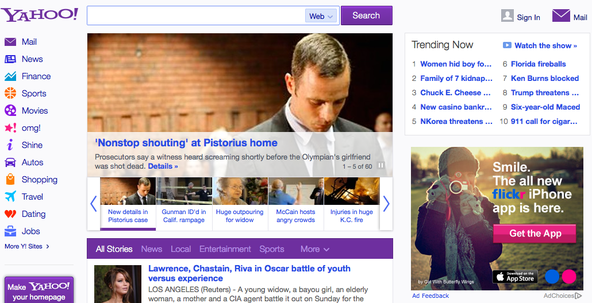
8:39 a.m. | Updated On Wednesday, Yahoo introduced a fresh new home page with Marissa Mayer’s stamp all over it.
Yahoo’s home page has long been a sort of sad reflection of the company. A jazzed-up Craigslist of sorts, the site was often cluttered with low-quality ads and irrelevant content and in no way reflected the fact that Yahoo is one of the most visited sites on the Web. With more than 700 million monthly visitors, Yahoo is still a leading source of information for sports, finance and entertainment.
Ms. Mayer took the reins as Yahoo’s chief executive last July. Before that she was a long-time executive at Google, where she was widely credited with the simple look of the Google search page. Now she seeks to apply that same, clean aesthetic to one of the most chaotic sites on the Web.
In an interview Tuesday, Ms. Mayer said she wanted to make Yahoo’s site “fresh and dynamic and add an element of surprise and serendipity.”
Gone are the low-quality ads. She has added an infinite, Twitter-like news feed and a stream of content recommended by users’ Facebook friends. Instead of trying to jam every Yahoo feature onto the site, the new design gives special prominence to Yahoo’s most popular Web properties: Yahoo’s e-mail and news service, Yahoo Finance, Yahoo Sports, its movie listing site and OMG, its popular entertainment site.
Users can now easily share content they see on the home page via e-mail, Twitter or Facebook with one click. They also have limited ability to customize the site to their liking. They can turn off home page features like horoscopes, stock quotes and sports stats. Ms. Mayer pointed out that the more items users switch on and off, the smarter the Yahoo algorithm gets and the more relevant content Yahoo will serve up.
Yahoo’s redesigned home page is the third major aesthetic improvement Ms. Mayer has introduced since joining the company. In December, she redesigned Yahoo’s e-mail service and its once-popular photo-sharing service Flickr.
In the interview, Ms. Mayer said these would be the “first of many releases” and she would turn her focus to a dozen or more Yahoo products. Her next priority for the home page, she said, will be adding content sources. In December, Yahoo signed three deals, with CBS Television, NBC Sports and ABC News. In each case, the media companies will work with Yahoo to promote each other’s content and produce original video content for the Web.
“We’re introducing a new way to welcome people to Yahoo,” Ms. Mayer said.
But it’s more than aesthetics. Ms. Mayer is betting that the renewed focus on Yahoo’s products will turn around the company’s ailing display ad revenue. Yahoo, once the biggest seller of display ads in the United States, went from a leading 15.5 percent share of all digital ad revenues in the United States in 2009, to an 8.4 percent share last year, even as total digital ad spending grew, according to eMarketer. Meanwhile, its competitor, Google, increased its share to 41 percent.
Last month, she told analysts, “More personalized content and increased product innovation will be key to getting us back to the path for display revenue growth.”
Article source: http://bits.blogs.nytimes.com/2013/02/20/marissa-mayer-puts-her-stamp-on-yahoo-com/?partner=rss&emc=rss